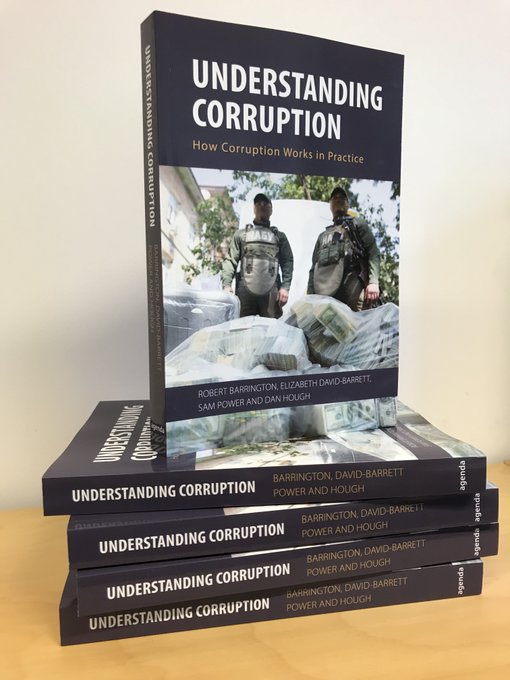Laurence Cockcroft reviews ‘Understanding Corruption: how corruption works in practice’ and writes that the use of the case study template provides good analysis of the issues surrounding corruption and it is a useful, albeit partial, guide to the nature of corruption within national contexts.

This book is a serious attempt to relate various ‘theories’ surrounding corruption with a factual account of corruption in recent years and the follow up retribution in those limited number of cases where it has occurred. In order to achieve this the authors work through a series of eighteen cases from around the world, eventually exploring the murky (and now highly controversial) world of illicit finance in London and elsewhere. For the latter they use information in a context where there have been very few high level cases which have reached the courts, or even been brought to book by regulators.
The book’s structure allows it to deal first with cases of corporate corruption from Latin America (Odebrecht), Indonesia and Saudi Arabia (Alstom), Nigeria (PanAlpina), and the UK (‘small scale’ corruption) ; second, with ‘political corruption’ (Azerbaijan and the Council of Europe), France (Jacques Chirac) and the US (defence procurement) ; third, with kleptocrats and state capture (notably South Africa, Angola and Turkey) ; and fourth, with corrupt capital, embracing issues from high profile banks and investment houses (Goldman Sachs), to low profile regulators (London and the Caribbean), to professional enablers (notably in London). The authors conclude that a recognition of the complexity of different forms of corruption and so of different routes to address it, is essential to its future control. Their major purpose is to promote a wider understanding of this in both the academic and professional worlds.
The individual cases have been widely reported, and as they write, are well recognised territory. However their technique of almost Socratic questioning (as to how, why and what to do about it) is very useful and throws light on each of the cases. There are a series of useful quotes from important players, such as the GE executive who said (when taking over Alstom) ‘their costs of bribery were not significant and would just lead to a lower dividend’. Aware of the link between bribery and party funding they note that in the Oldebrecht case three per cent of the $1 billion paid in bribes across twelve Latin American countries (including Brazil) was channelled to the Workers Party of Brazil
The examination of political corruption more specifically does justice to the question of ‘illegal’ and ‘legal corruption’ (as in various forms of party funding), taking in Azerbaijan (and the Council of Europe), the USA (the revolving door in defence), the extraordinary cases of Alain Juppe and Jacques Chirac (Prime Minister and President of France respectively). In the separate section on ‘state capture’ the authors take us to South Africa (where the phrase was formalised by a Government Commission), and the saga of the Dos Santos family in Angola where oil became the key to the fortune of Africa’s richest woman, and to Turkey (with an interesting and convincing account of how Istanbul’s ‘liberal’ mayor became a strident Presidential autocrat).
The account of the labyrinth of illicit finance and money laundering dives into an even deeper complexity but succeeds in showing how unsuccessful the EU and the UK have been in checking the flow of illicit finance, with the US only slightly ahead. Here we are in the world on the one hand of the looted assets of corrupt regimes but also of ‘transfer pricing’ by which companies trading on an international basis manipulate export and import prices to transfer trading profits to secrecy jurisdictions in various locations (here notably the Overseas Territories of the UK in the Caribbean). The fact that criminal trials for money laundering have been minimal in London, and fines scarcely significant, is laid out in useful detail. The inherent contradictions of a regime in which successive British governments have promoted self regulation by private sector professionals is convincingly explored, with the message that this system has effectively failed and must be replaced (but not by the disfunctional OPBAS). They revert to a quotation that it is ‘to a large extent ethical questions that lie at the heart of the professional enablers debate’.
In all these respects ‘How Corruption Works in Practice’ is a good analysis of the issues associated with corruption drawn mainly from cases where its ramifications occur in the ‘west’ even if the corrupt act occurs in the ‘developing’ world. However, the analysis has two major weaknesses : first, it pays short shrift to the need for a much more sophisticated understanding of the underlying interest groups furthering corruption in a given national context, and secondly it neglects (almost entirely) the role of the informal economy as a key source of corrupt payments. In the first case it is now abundantly clear that a network of interest groups can influence political outcomes and regroup when political power nominally passes from one part to another. Exposure of corruption in these contexts is often simply the tip of the iceberg. In the second case, given that the informal sector, often accounts for thirty to forty per cent of the size of GDP in the developing world, it also a huge reservoir of unrecorded payments which are not touched by regulation and scarcely affected by legislation. Not only organised crime but many unrecorded businesses conduct their operations in this environment in which corruption can flourish.
The book would be stronger it it had acknowledged these issues, but it is nonetheless a very useful if partial guide to the nature of corruption as it is manifested in many national contexts.
Laurence Cockcroft is the author of ‘Global Corruption : Money, Power and Ethics in the Modern World’ (IB Tauris, 2013) and co-author (with Anne Christine Wegener) of ‘Unmasked : Corruption in the West’ (IB Tauris, 2017)


Leave a Reply